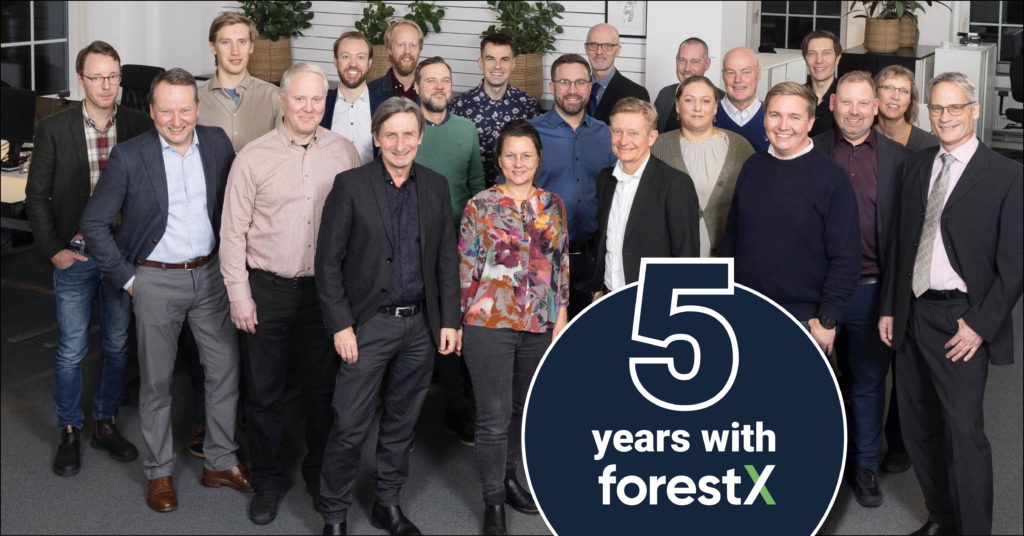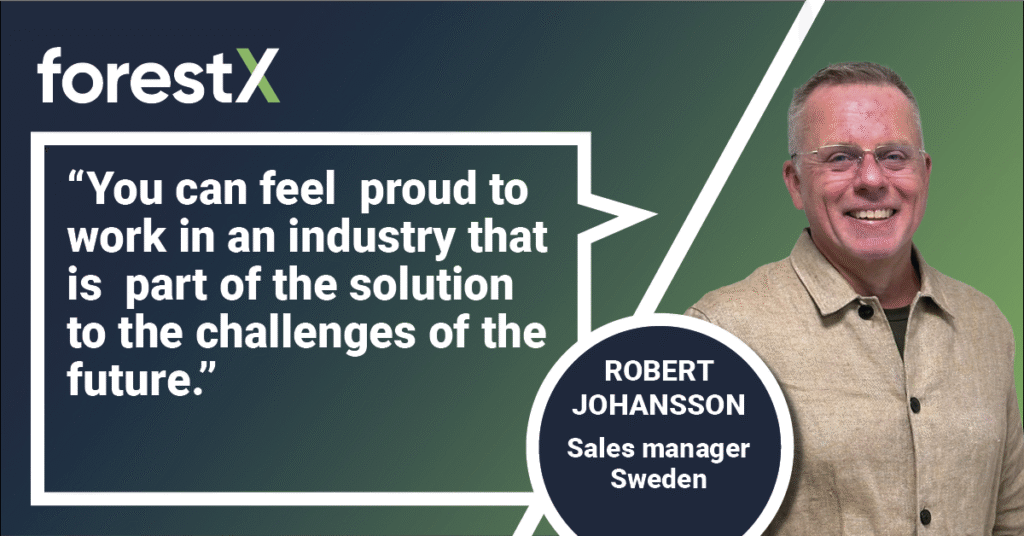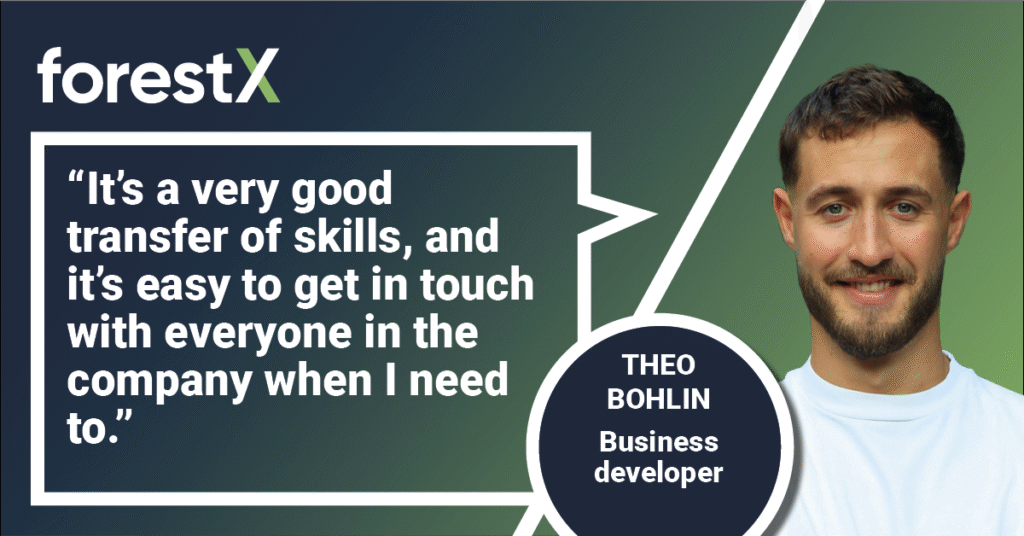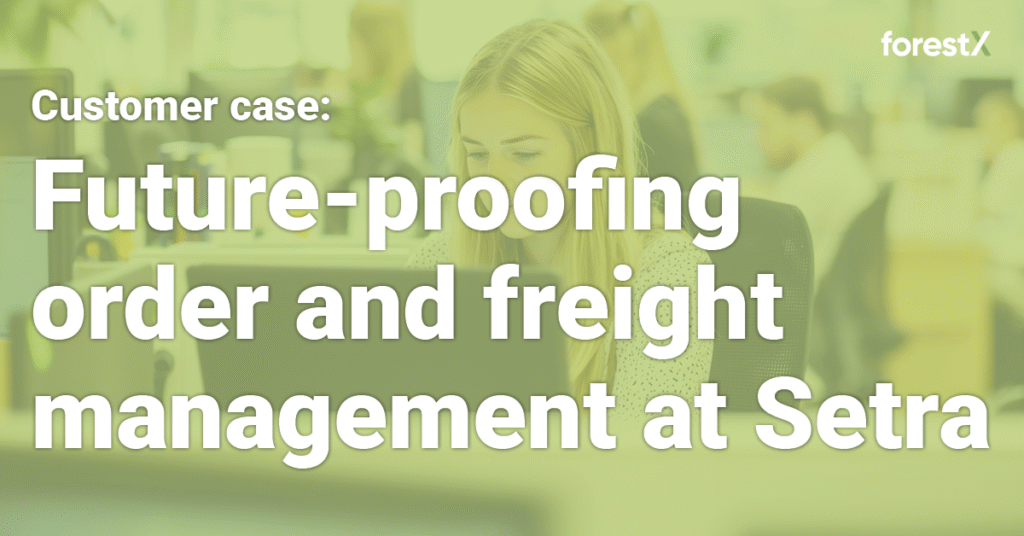Gothenburg
From a handful of people in an office hotel on the outskirts of Gothenburg in 2018 to over 50 coworkers in several countries today. Founders Christer Lindqvist and Carl Barck summarize ForestX’s first five years – and look ahead.
In autumn 2023, ForestX was named Gasell 2023 by leading Swedish business newspaper Dagens Industri for its rapid and stable growth. It coincided with the company’s fifth anniversary and is a good starting point to sum up the years that have passed.
“We simply created the company that was missing in the industry; an IT consulting company with products that work towards the forest industry's core processes."
How was the idea for ForestX born? How did you see the needs of the forestry industry five years ago?
Christer Lindqvist: Carl and I have always had the same vision since we got to know each other in the 1990s. We want to develop processes and technology in the forest industry through smart and good solutions.

Carl Barck: We simply created the company that was missing in the industry; an IT consulting company with products that work against the forest industry’s core processes. All industries need this kind of company, which works with digitization for a specific industry.
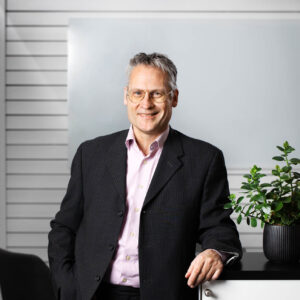
Christer Lindqvist: With ForestX we have added a number of dimensions. It is about:
- Supply good and modern products.
- Have a forward-looking and clear partner model where we can offer the best specialists and products that fit exactly into our customers’ needs.
- Have a flexible delivery model where we can quickly scale up development needs through our team in India.
Through this, our customers get better control of their information, more efficient processes, increased profitability, faster and simpler decisions and the opportunity to adapt their systems to new technological possibilities.
Carl Barck: IT and digitization are general tools, but when it is to be used and applied, one must understand the business. We do it because we have so much forestry expertise in the company, a third of our employees have a forestry background. Honestly, there is no equivalent to us in all of Europe, maybe not even globally.
How has ForestX grown?
Christer Lindqvist: We have grown entirely organically with a well-thought-out method based on an open and flexible model to be able to collaborate in various forms of ecosystems with our customers and partners. Within the framework of our business concept, we want to operate in the entire forest value chain from seed to finished product, but in practice we have so far mostly worked in forestry and the wood industry.
Carl Barck: Geographically, we have gone from having been focused on Sweden and Scandinavia to now, after five years, seeing the whole of Europe as our main market. In practical terms, we have established offices in several Swedish cities and in two locations in Europe. In addition, we have our team in India.
"Honestly, there is no equivalent to us in the whole of Europe, perhaps not even globally."
Any milestones to mention?
Christer Lindqvist: They are many! From our first office in Gothenburg until we were able to inaugurate our office in India in the spring of 2023. Then I remember things like the first license deal for Optinex at Pfeifer in Austria and when we implemented CFHarvest at HedeDanmark . The Gaselle award we received in autumn 2023 from Dagens Industri confirms and summarizes how steady our growth journey has been.
Carl Barck: I would especially like to mention our deals in Europe with Pfeifer, Mayr-Melnhof and Rubner that has been significant steps. At home, I want to highlight the work with Trimble Forestry CFHarvest at Sydved. The latest big thing is our project with Holmen. It is an important deal for us, it is the first Connected Forest deal in Sweden. We have felt stability and security in our collaboration with Trimble in working on this deal and others as well.
"During the pandemic years, we actually had our strongest growth to date."
Pandemic, war in Europe and a troubled outside world – what has it been like to start a company under those circumstances?
Christer Lindqvist: Of course, the unrest in Europe and the world has shaped us and nothing can be taken for granted anymore, we are enormously humbled by this. The pandemic years did not stop us. Through the model we had, we were able to expand and deliver our projects in a more efficient way when we had to take away offices, physical meetings and other activities from the workplan. On several occasions, it was striking to us how empty the office could be despite the workshop being in full swing. During the pandemic years, we actually had our strongest growth to date.
Carl Barck: We can see how the economic crisis has affected our customers in 2023 – many have had poor profitability. But for that reason, they have worked even more with us to strengthen their competitiveness. Our solutions also become our customers’ solutions to their problems.
Why is it important that the forest and wood industries continues to be digitized?
Christer Lindqvist: Today, the industry is under stronger pressure than ever to change in order to meet new climate goals and other EU regulations. Today’s forestry is also strongly questioned in its current form. New forest owners place new demands on forest companies but also see new areas of use for their forest, from the investor side we also see a greater interest in forest ownership.
The increased rate of digitization affects and has affected all industries. The forest industry is both behind and ahead of other industries, but what is most affected is increased availability of information, the ability to process large amounts of data, new technology that can facilitate time-consuming manual work and the great demands on environmental effects and sustainability.
"New forest owners make new demands on forest companies, but also see new areas of use for their forest."
Carl Barck: On the wood side, it is about maintaining competitiveness. It is about becoming more efficient in resource utilization and how to use your staff. The forest has a challenge in the changes that will take place where we move towards more control and knowledge about the forest and the forest land. Felling will be less. IT solutions and digitization are the key to maintaining production.
What needs do you see the forest industry having going forward?
Christer Lindqvist: Regardless of which areas are changed and/or made more efficient, new digital systems and tools will be central. We see that companies like ForestX will be perfectly positioned in this change.
Carl Barck: We see an increased need for better decision support. You get that with the help of optimization and AI in planning and control.
What lessons have you learned as entrepreneurs from the years with ForestX?
Carl Barck: It is a challenge to go from the small startup company where you have to manage everything yourself to the large established company where you have to work in a different way. During 2022 and 2023, we have actually created a new company in terms of structure. We had to make that shift, we are now approaching 60 coworkers.
Christer Lindqvist: Some of the most central lessons as entrepreneurs and specifically the forest industry that we have worked in are:
- The importance of a clear and focused business model.
- Long-termism and perseverance, that is, we must always believe in what we are doing to reach our goals.
- Team delivery. We always work cross-skills in our assignments and respect each other’s contributions.
- Relationship, relationship and relationship. We do business and projects with people with whom we build a long relationship.
Where will ForestX be in another five years?
Carl Barck: We do what we do now, but in more places, more customers and in more branches of the forest industry.
Christer Lindqvist: We are simply present in more industries within the forestry value chain. Our collaborations with our partners are even stronger. Our team in India has further developed and has a stronger presence in all our deliveries.

